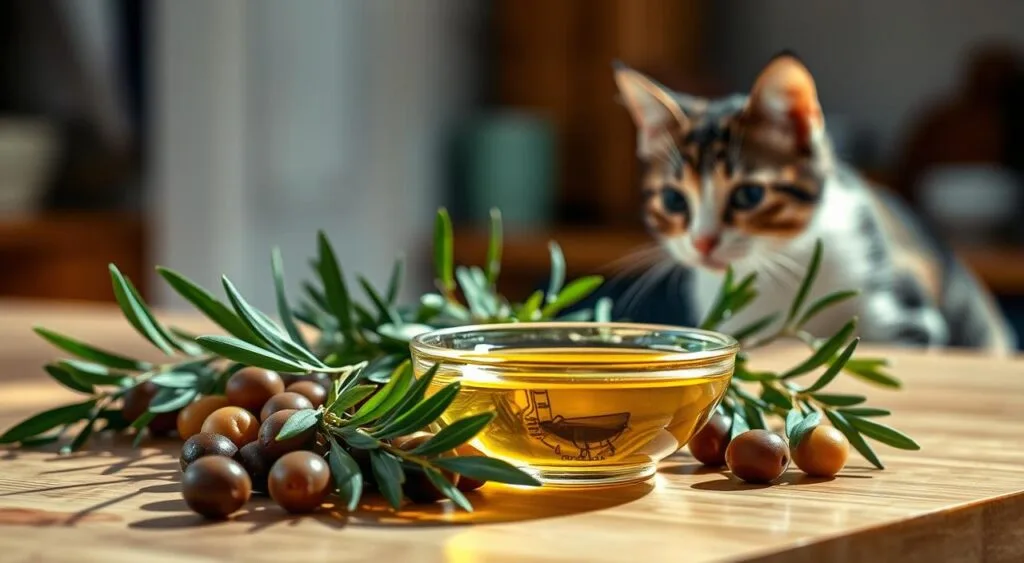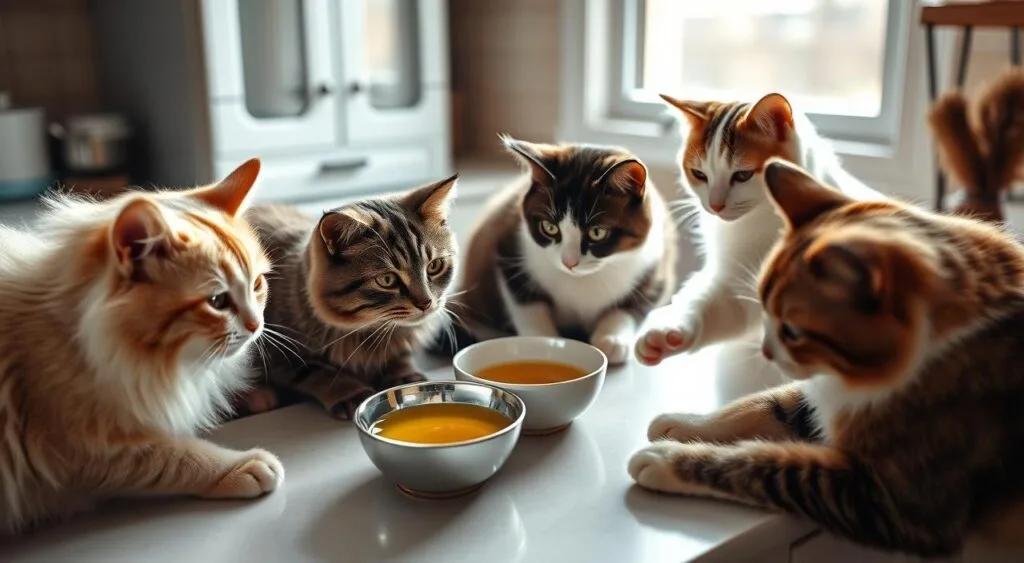As a pet parent, you might wonder if olive oil is good for your cat. It’s known for its health benefits in humans. But, it’s important to know if it’s safe for cats. We’ll look into olive oil’s effects on cats and their nutrition.
Is olive oil safe for cats? There are many things to think about. Humans love olive oil, but it’s not clear if it’s good for cats. We’ll explore the benefits and risks of olive oil for cats.
Knowing if cats can have olive oil is key to their diet. We’ll dive into how olive oil affects cats’ nutrition. This guide will help you decide if olive oil is safe for your cat.
Introduction to Olive Oil Safety for Cats
Key Takeaways
- Consider the safety of olive oil for your cat before adding it to their diet
- Understand the components of olive oil and its effects on cats
- Olive oil and feline nutrition require careful consideration
- Can cats have olive oil? It’s essential to examine the benefits and risks
- Is olive oil safe for cats? We’ll provide you with a comprehensive guide
- Make informed decisions about your cat’s diet and olive oil consumption
Understanding Olive Oil and Its Components
Olive oil is full of healthy fats, antioxidants, and vitamins. It’s a favorite for humans. But, it’s important to know the good and bad for cats. Olive oil can help cats’ hearts and reduce inflammation.
There are many types of olive oil, like extra virgin, virgin, and pure. Each has its own special qualities. Knowing these differences is key when thinking about olive oil in cat food. Extra virgin olive oil is the best quality and offers the most health benefits.
Key Nutrients in Olive Oil
Olive oil is mostly monounsaturated fats, which are good for the heart. It also has antioxidants and vitamins like E and K. These can make cats’ skin and coats healthier.
Different Types of Olive Oil Available
The types of olive oil include:
- Extra Virgin Olive Oil: the highest quality and most health benefits
- Virgin Olive Oil: slightly lower quality but still has health benefits
- Pure Olive Oil: a mix of refined and virgin olive oil
What Makes Olive Oil Unique from Other Oils
Olive oil stands out because of its monounsaturated fats and antioxidants. This makes it great for benefits of olive oil for cats, like better heart health and less inflammation. But, always talk to a vet before giving olive oil to your cat. This ensures it’s safe and right for them.
| Type of Olive Oil | Health Benefits |
|---|---|
| Extra Virgin Olive Oil | Improved heart health, reduced inflammation |
| Virgin Olive Oil | Improved skin and coat health, reduced inflammation |
| Pure Olive Oil | Improved overall health, reduced risk of chronic diseases |
Can Cats Have Olive Oil? The Basic Facts
When it comes to can cats eat olives or olive oil, the answer is not simple. Olive oil is good for humans but not the same for cats. Cats have a special digestive system and need different nutrients than humans. Knowing the basics of olive oil for cat health is key before making any choices.
A feline diet olive oil can be good in small amounts. But, it’s important to think about the risks and benefits. Here are some key points to consider:
- Olive oil can be a healthy addition to a cat’s diet in moderation.
- Cats have specific nutritional needs that differ from humans.
- Too much olive oil can cause digestive problems in cats.
It’s also important to note that not all olive oils are the same. Some are better for cats than others. When thinking about can cats eat olives or olive oil, choose a high-quality oil that’s safe for cats.
In conclusion, olive oil can be good for cats but with caution. Understanding the basics of olive oil for cat health and feline diet olive oil helps make good choices. This ensures your cat gets the right nutrients to stay healthy.
| Olive Oil Type | Suitable for Cats |
|---|---|
| Extra Virgin Olive Oil | Yes, in moderation |
| Light Olive Oil | No, due to high polyunsaturated fat content |
The Science Behind Cats and Fat Digestion
Cats are meat-eaters by nature, with a body made for digesting lots of protein and fat from animals. When we talk about giving olive oil to cats, knowing how they digest fats is key. Their digestive system is very different from ours, making it hard for them to break down plant fats like olive oil.
The liver and pancreas play a big role in how cats digest fats. They need certain nutrients, like arachidonic acid and linoleic acid, which are in animal fats. But, they struggle with olive oil, a plant fat. This is important to know when thinking about olive oil and cat nutrition, as too much can upset their stomachs.
How Cats Process Fats
Cats break down fats in their liver through beta-oxidation. This turns fatty acids into energy. But, cats might have trouble with the monounsaturated fats in olive oil.
Digestive System Differences
Cats have a shorter digestive system than humans, with a bigger liver and pancreas. This helps them digest lots of animal protein and fat well. But, it also means they can’t handle a lot of plant fats, like in olive oil.
It’s important to know these differences when thinking about giving olive oil to cats. This helps cat owners make the best choices for their cat’s diet. It ensures they get the right nutrition.
Potential Benefits of Olive Oil for Cats
Olive oil may offer several benefits for cats when used carefully. Its anti-inflammatory properties can help reduce inflammation and improve health. Also, the antioxidant content in olive oil can protect cats from cell damage and lower disease risk.
Some benefits of olive oil for cats include:
- Support for skin and coat health
- Aid in digestion and reduction of inflammation
- Antioxidant properties to protect against cell damage
Before adding olive oil to a feline diet, talk to a vet. They can help figure out the best amount for your cat. The benefits of olive oil for cats are real, but it’s important to use it sparingly. Olive oil for cat health is a good supplement, but it shouldn’t replace regular vet visits or a balanced diet.

Safety Concerns and Risk Factors
When thinking about olive oil for cats, it’s key to know the safety issues. Olive oil can be good in small amounts, but it’s important to watch for signs of intolerance. The question of is olive oil safe for cats depends on the cat’s health and needs.
It’s important to remember that cats digest food differently. To use olive oil safely, follow the right dosage and watch how the cat reacts. So, can cats have olive oil? Yes, but with care and attention to possible risks.
- Vomiting or diarrhea
- Lethargy or lack of appetite
- Skin irritation or allergic reactions
To use olive oil safely, start with a little and add more if needed. Always pick a high-quality olive oil that’s pure and has no additives.
| Factor | Risk Level | Precautions |
|---|---|---|
| Olive oil quality | High | Choose pure, additive-free oil |
| Dosage | Medium | Start with small amounts, monitor response |
| Individual cat health | High | Consult with veterinarian before use |
Knowing the safety issues with olive oil for cats helps owners make better choices. This ensures the health and happiness of their pets.
How to Introduce Olive Oil to Your Cat’s Diet
When you think about adding olive oil to your cat’s food, start slow. This helps avoid stomach problems and lets you see how your cat reacts. Begin with a tiny bit, like 1/4 teaspoon for every 10 pounds of your cat’s weight. Then, you can slowly add more.
To make the transition easy, follow these steps:
- Start with a small amount of olive oil and watch your cat for a few days.
- If your cat seems fine, you can slowly add more olive oil to their food.
- Make sure to use high-quality olive oil that is safe for cats.
Every cat is unique, so keep an eye on how they act. If your cat has stomach issues like diarrhea or vomiting, cut back on the olive oil. Or, talk to your vet for advice.

Common Uses of Olive Oil for Cat Health
Olive oil is a natural remedy for cats. It supports their health in many ways. It can help with skin and coat issues, and even aid in digestion.
It’s also used to treat ear infections. Just a few drops in the affected ear can help. Olive oil adds nutrients and antioxidants to a cat’s diet.
Olive oil can make a cat’s coat shiny and reduce shedding. Add a small amount to their food or apply it to their coat. But, be careful not to get it in their eyes or ears.
- Skin and coat care
- Digestive support
- Ear infection treatment
- Reducing shedding and promoting a healthy coat
Always talk to your vet before giving olive oil to your cat. They can guide you on how much and when. This way, you ensure your cat gets the best care and nutrition.
Alternatives to Olive Oil for Cats
Olive oil can be good for cats, but some owners look for other options. If you’re curious about can cats eat olives or other oils, the answer is yes. However, it’s key to pick the right ones for your cat’s needs.
Coconut oil and salmon oil are good alternatives to olive oil for cats. They offer health benefits like better skin and coat health. When thinking about cats olive oil consumption, consider coconut oil for skin issues or salmon oil for joints.
- Coconut oil: rich in medium-chain triglycerides (MCTs) for skin and coat health
- Salmon oil: high in omega-3 fatty acids for joint support and heart health
Always talk to your vet before adding new oils or supplements to your cat’s diet. They can guide you to the best choices for your cat’s health and a balanced diet.
What Veterinarians Say About Olive Oil for Cats
Veterinarians offer important advice on using olive oil for cats. If you’re wondering is olive oil safe for cats, talking to a vet is key. They can tell you if olive oil is good for your cat’s health.
Many vets say can cats have olive oil depends on several things. This includes the cat’s health and needs. Some vets suggest using olive oil carefully. It might help with your cat’s skin and coat.
Recent studies suggest olive oil could help cats stay healthy. But, it’s important to listen to your vet’s advice. This way, you can use olive oil safely and effectively for your cat.
- Always consult with a veterinarian before adding olive oil to your cat’s diet.
- Follow professional recommendations for dosage and administration.
- Monitor your cat’s response to olive oil and adjust as needed.
Conclusion: Making the Right Choice for Your Feline Friend
Thinking about adding olive oil to your cat’s diet? It’s important to look at the good and the bad. Olive oil can make your cat’s coat shiny and help with digestion. But, you must think about your cat’s health and what they need to eat.
Olive oil has many benefits for cats, like a healthy coat and better digestion. Adding it slowly and watching your cat’s reaction is key. Always talk to a vet before changing your cat’s diet. They can give advice that fits your cat’s needs.
By knowing what’s best and being careful, you can choose the right thing for your cat. Always think about what’s best for your cat and talk to a vet. They can help you make the best choice for your cat’s health.
FAQ
Can cats have olive oil?
Olive oil is good for humans but not the same for cats. Cats have a special digestive system and need different nutrients. In small amounts, olive oil can be good for cats, but knowing the risks is key.
Is olive oil safe for cats to eat?
Yes, cats can eat olive oil in small amounts. But, watch out for signs like vomiting, diarrhea, and feeling tired. If you see these, talk to your vet right away.
What are the benefits of olive oil for cats?
Olive oil might help cats with inflammation, antioxidants, and skin health. But, it should not be their main food.
How much olive oil can I give to my cat?
The safe amount of olive oil for cats is not fully known. Start with a tiny bit (1/4 teaspoon for every 10 pounds of cat) and add more if needed. Always check with your vet first.
Can I use olive oil as a substitute for my cat’s regular oil supplement?
No, olive oil is not a good substitute for your cat’s regular oil. Cats need a balanced diet with omega-3s, vitamin E, and more. Olive oil can be a supplement, but choose a cat-specific oil.
Are there any alternatives to olive oil for cats?
Yes, there are other oils like coconut, salmon, and flaxseed. These can offer similar benefits and might be better for your cat.
Can cats eat olives?
Olives are not bad for cats but not very nutritious. They can upset a cat’s stomach if eaten too much. Stick to olive oil as a supplement and avoid giving olives.
How do I introduce olive oil to my cat’s diet?
Start by adding a small amount (1/4 teaspoon) to their food. Slowly increase it while watching your cat. Always talk to your vet before changing your cat’s diet.
What do veterinarians say about olive oil for cats?
Vets say to use olive oil carefully and watch your cat closely. They also stress the importance of using a high-quality cat-specific oil and following the right dosage.
